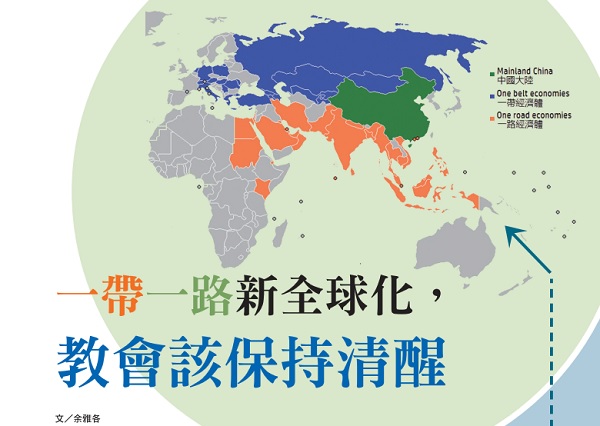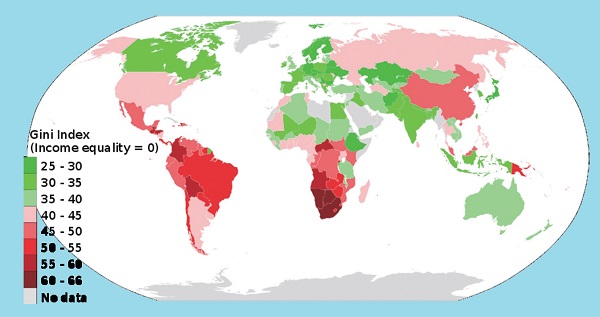The Belt and Road New Globalization, the Church Should Stay Sober

▲One Belt, One Road, "the abbreviation of Silk Road Economic Belt and 21st Century Maritime Silk Road", is a transnational economic belt initiated and led by China in 2013, covering the countries that the historical Silk Road and Maritime Silk Road passed through. and regions to form a higher level land, sea and air exchange network. (This image was produced by Tart based on Xxjkingdom’s Hong Kong Qatar Locator.png, source:https://commons.wikimedia.org/w/index.php?curid=50039039)
Globalization is an evolving process. The most recent one has been led by the United States since the 1990s. The free economy has swept the world, and Internet technology has added fuel to the fire. The power of multinational corporations has reached an unprecedented peak in history.
More than two decades later, we can’t help but ask, who is benefiting from this wave of globalization? Has the original beautiful vision been realized? Is the world becoming a safer place? More prosperous? More freedom?
There is no doubt that the United States should have been the winner of this wave. However, today in the United States, the outflow of manufacturing industries has caused the unemployment of a large number of workers. The Midwest that once supported the American industry has become the "Rust Belt"; multinational companies have brought new types of environmental pollution to the United States, and poverty has The wealth gap is huge, the financial structure is riddled with problems, and the "anti-terrorism" war has impoverished the people and the country.
And what about China? The economy seems to be developing rapidly, but in just two decades, the Gini coefficient, an indicator of the gap between the rich and the poor, has risen sharply from almost zero to 50. This has caused continuous environmental damage, deterioration of the investment environment, and worsening of the gap between the rich and the poor... . Other industrial countries that emerged after World War II relying on cheap land and labor also paid a heavy price. The young generation in developed economies in East Asia, such as China, Japan, South Korea, Taiwan, and Hong Kong, have become the recipients of high housing prices and deteriorating labor conditions, and feel at a loss about their future.

▲The Gini coefficient is an indicator for judging the fairness of annual income distribution. The smaller the coefficient, the more even the annual income distribution is; the larger the coefficient, the more uneven it is. (This figure was produced by M Tracy Hunter based on World Bank data in 2014. Source:https://commons.wikimedia.org/w/index.php?curid=33962866)
Different from the "ocean port-style globalization" of the United States, the China-led One Belt and One Road is the starting point for a new wave of "inland-style globalization." This seems to be a good gospel opportunity, but we must also ask ourselves, did the last wave of globalization bring real prosperity? Or a long-term disaster? Capitalists are always looking for cheaper land and labor. After making everything, they leave and leave behind, leaving behind a superficial and short-term GDP (gross domestic product), a polluted environment, a serious gap between rich and poor, and an aggressive economy. The turmoil it brings.
Therefore, when praising the evangelization opportunities brought by the Belt and Road Initiative, the church must stay awake. When conducting commercial missions, it must reflect on whether it can take on the role of guardian of the land and become a blessing and protection for the local people. If we only emphasize the economic opportunities that are coming, how far away is that from the pathetic prosperity gospel?
It must be said frankly that this new wave of globalization is unstoppable, and the church seems unable to do anything. However, teaching history shows that the church’s inaction on society and its unpreparedness for trends often turn into another kind of sin. Sometimes we look at rampant violence with a cold eye, like in Germany; we stand by and watch the gap between rich and poor harm the weak, like in post-war Hong Kong, Taiwan, and South Korea. Will we do the same this time?
If the trend is clearly visible, the church should be prepared to become the guardian of the land, the righteous voice for the distribution of social resources, the far-sighted manager of industrial development, and the whistleblower for the correct development of the country. When we take a closer look at the faces of the people of Central Asia: Kyrgyz, Kazakh, Tajik, Uzbek... When the world is focused on gaining great wealth, the Church of God should not forget to protect values that are more important than economic development, not only souls, but also There is land, society, justice….
